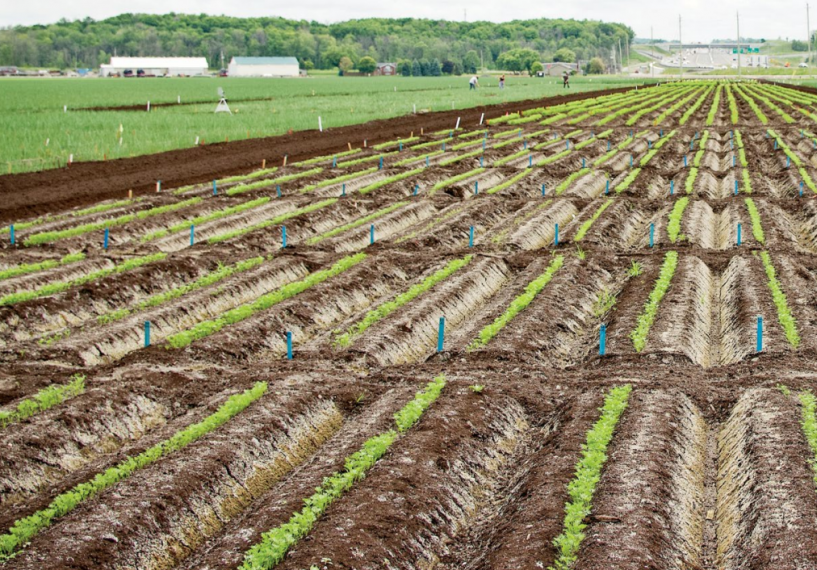Marvellous muck: Muck soil’s loose particles let vegetables grow with ease

Hidden in plain sight—if that’s even possible, with Ontario’s bustling Highway 400 cutting through it—is one of North America’s most influential vegetable field research facilities, the Government of Ontario’s Bradford Muck Crops Research Station.
As field research stations go, it’s hidden because it’s relatively small. At just four acres, it’s about the size of four football fields.
But knowledge mobilized from the muck station, located in the heart of the Holland Marsh, has given this small location big international recognition through research that enhances farming practices in unique muck conditions.
Muck soil is the organic black soil left after draining swamp or marshland. This moist organic substrate conserves water and releases plant nutrients. Loose soil particles allow root vegetables such as carrots and onions to grow big without much resistance from the soil.
That feature has helped farmers in the Holland Marsh, which covers 7,000 acres, produce more than $50-million worth of crops annually—accounting for nearly 15 per cent of Ontario’s total vegetable production— including 85 per cent of Ontario’s onions and 90 per cent of the celery produced in the province.
The Muck Crop Research Station’s mission is to help farmers find ways to more effectively grow crops and deal with pests that might affect vegetable yield in this specific terrain. The soil’s moistness, while promoting vegetable growth, can also help certain plant fungi and other organisms thrive, causing diseases such as leaf blight, cavity spot and clubroot.
“Sustainable production and integrated approaches to crop protection are the overarching themes here,” says plant agriculture Prof. Mary Ruth McDonald, research program director for the Ontario Agri-Food Innovation Alliance. “Growers and consumers benefit from our research through consistent production of high-quality vegetables that are produced in a sustainable manner with minimum disruption to the environment.”
Indeed, a report from the Friends of The Greenbelt Foundation says the techniques, tools and protocols developed at the Muck Research Station have reduced pesticide use in the Holland Marsh by about 40 per cent.
A key focus is the station’s integrated pest management (IPM) program, specifically developed to assess and combat agricultural pest emergence in muck crop fields. Scientists and trained summer students join to perform twice-weekly field observations—looking for the presence of potential crop hazards like bacterial infections or insect infestations— after which the station releases a report informing farmers of diseases and pests that may present an imminent problem.
Equipped with this information, farmers can focus preventive measures on the most relevant threats.
In addition to preparing these reports, researchers involved in the IPM program develop novel technologies, pesticide application strategies and crop growing patterns to fight pests in the field.
Zachariah Tefler, the program’s coordinator, identified the most effective pesticide to diminish weevil attacks on carrot crops. This treatment increased carrot yield by allowing plants to invest more resources into growth instead of defending themselves against insects.
“Information on the risk of disease development informs growers of when there is no need to apply sprays and allows for the correct timing of crop protection materials when needed,” says McDonald. “Growers can also choose cultivars that are less susceptible to diseases or insect damage and use other crop protection approaches to produce high-yield and quality crops.”
The station also produces an annual cultivar trial and research report of recent projects ranging from pest management strategies to innovative muck crop growing techniques to cultivar evaluations.
Cultivar evaluations describe varieties of crops typically grown in the Holland Marsh. Evaluations include records of physical characteristics like weight, colour and insect resistance that can help farmers make informed decisions about which crops to grow on their properties.
“The annual cultivar trial and research report is an important reference for growers in the Holland Marsh,” says McDonald. “The report contains all of the leading-edge results that may not be published in other formats for months or years.”
Preserving the landscape
Besides developing practical muck farming techniques and pest management strategies, researchers at Muck Crop Research Station explore how muck agriculture may affect the environment around the Holland Marsh. One approach involves adding phosphorus. Phosphorus is an essential nutrient for crops and may not be available when soils are cold early in the spring. Farmers must add phosphorus fertilizers to improve crop yield. Excess phosphorus may find its way into the sediments of adjacent lakes and rivers, causing water bodies to become eutrophic.
Plant agriculture professor Ivan O’Halloran is researching how much phosphorus is lost from Holland Marsh farms by comparing concentrations in sediment beside water bodies with those of the muck soils. He found that inorganic phosphorus was more likely to leave the fields and enter surrounding rivers than organic phosphorus. By identifying potential negative environmental effects of muck farming, these findings may suggest research to avoid these issues and preserve the Holland Marsh landscape.
Research featured in this story was supported by the Ontario Agri-Food Innovation Alliance. Additional funding was provided by Fresh Vegetable Growers of Ontario, Bradford Cooperative Storage Ltd., Ontario Canola Growers, the Canadian Agricultural Partnership, Growing Forward 2, the California Garlic and Onion Research Advisory Board, and the California Fresh Carrot Research Advisory Board.
Articles in Research magazine are written and produced in part by participants in the Students Promoting Awareness of Research Knowledge (SPARK). See more stories from the 2019 Agri-Food Yearbook (PDF).